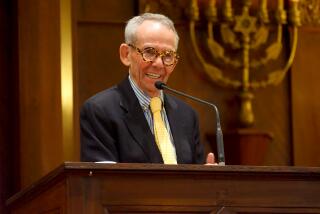BOOK REVIEW / BIOGRAPHY : Ideas Were Not Critic’s Only Companion : EDMUND WILSON <i> by Jeffrey Meyers</i> , Houghton Mifflin Co., $35, 483 pages
- Share via
In what is a welcome departure, Jeffrey Meyers’ latest biographical subject represents previously uncharted territory. Unlike such literary superstars as D.H. Lawrence, F. Scott Fitzgerald and Ernest Hemingway, all of whose charismatic and overly documented lives he mined for untapped lodes of melodramatic revelation, Edmund Wilson, on the surface of things, seems not a heroic enough figure to inspire a full-fledged study by this prolific biographer.
Wilson was a soft-bodied, baldish man whose writing career began unprepossessingly. Starting in the 1920s as a free-lance book reviewer, essayist, and reporter of popular culture, he would, over the next half-century, turn out 50 volumes of criticism, history, foreign travel accounts, memoirs, drama and fiction. “America’s best mind,” Gore Vidal called him.
Beginning with an excellent education at a Pennsylvania prep school and then at Princeton University, Wilson developed a rigorous method of composition that Meyers succinctly describes as “a cunning mixture of nostalgic autobiography and contentious opinions.” He was ever at work and he took no shortcuts.
Whatever subject engaged him--French symbolist poetry, Russian communism in the ‘30s, the literature of the Civil War--he ransacked the resources of his capacious mind and the many books he carefully read to locate central truths.
His thinking had its blind sides, though. He was as stubbornly determined as the bulldog, whose features he came to resemble physically and whose pugnaciousness he would emulate in personal relationships as the years went by. Meyers describes several such stonewalling incidents. Wilson did not pay his income taxes for a decade largely through lordly neglect, and he did without a telephone in his Cape Cod summer house because he resented the phone company’s insistence on a $10 deposit.
In rounding out the complex and often contradictory nature of his subject, Meyers tracks Wilson’s social life to edifying effect. Ideas were not Wilson’s only companions. He was seemingly insatiable when it came to matters of the mattress. In addition to four marriages, he had affairs with women of all types, by the dozens, well into his 70s.
Meyers wisely skirts the motivations for Wilson’s perpetual randiness, though he hints at possible sources, such as Wilson’s antipathy to his Puritan heritage (he was descended from the scholar and preacher Cotton Mather) or the emotional coldness of his mother, with whom Wilson skirmished throughout his life.
His prodigious drinking--analogous to his uncritical womanizing--was equally straightforward. He drank when the workday ended and simply continued throughout the evening until he had consumed whatever alcohol there was in the house.
Wilson was almost 70 when the first feature article on him was published. Just as his health began to fail, he found himself gaining official recognition. In typically truculent manner, he turned down a pacemaker in the year preceding his death. Meyers rightly admires the old curmudgeon’s independence and energy during his last difficult years.
Edmund Wilson obviously identified with the title character of his critical masterwork, “Axel’s Castle,” in which Axel rejected the physical world at large, preferring to live in his head. “Live? Our servants will do that for us,” he famously said. Wilson had it both ways--passionately expending both body and intellect in what was a productive and difficult life.
Jeffrey Meyers has captured this duality admirably in this, his most balanced biographical study.
More to Read
Sign up for our Book Club newsletter
Get the latest news, events and more from the Los Angeles Times Book Club, and help us get L.A. reading and talking.
You may occasionally receive promotional content from the Los Angeles Times.










